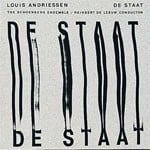Plato's Republic (Gr)
2S.2M-0.4(III,IV=corA).0.0-4.4.4(IV=btrbn).0-2elec.gtr-bass gtr-
2harps-2pft-4vla
Abbreviations (PDF)
Boosey & Hawkes
I wrote De Staat (The Republic) as a contribution to the debate about the relation of music to politics. Many composers view the act of composing as, somehow, above social conditioning. I contest that. How you arrange your musical material, the techniques you use and the instruments you score for, are largely determined by your own social circumstances and listening experience, and the availability of financial support. I do agree, though, that abstract musical material - pitch, duration and rhythm - are beyond social conditioning: it is found in nature. However, the moment the musical material is ordered it becomes culture and hence a social entity.
I have used passages from Plato to illustrate these points. His text is politically controversial, if not downright negative: everyone can see the absurdity of Plato's statement that the mixolydian mode should be banned as it would have a damaging influence on the development of character.
My second reason for writing De Staat is a direct contradiction of the first: I deplore the fact that Plato was wrong. If only it were true that musical innovation could change the laws of the State!
Louis Andriessen, 1994
Reproduction Rights:
This programme note may be reproduced free of charge in concert programmes with a credit to the composer.
De Staat marks the birth hour of what is sometimes called the Real Louis Andriessen: that exuberant mixture of pianos, wind instruments, bass guitars and close harmony-like voices. From minimalism à l' américaine and from earthiness à la hollandaise. Of disciplined formality and boyish bravado, of light-hearted irony and monumental seriousness.
Note by Elmer Schönberger, courtesy of the Louis Andriessen Platform
"Andriessen's big boned, hectically minimalist political essay De Staat demonstrated that it is possible to adapt Stravinskian rhythmic material to wholly individual ends." Daily Telegraph

Schoenberg Ensemble/Reinbert de Leeuw
Nonesuch 79251
Buy the MP3 album from Nonesuch

